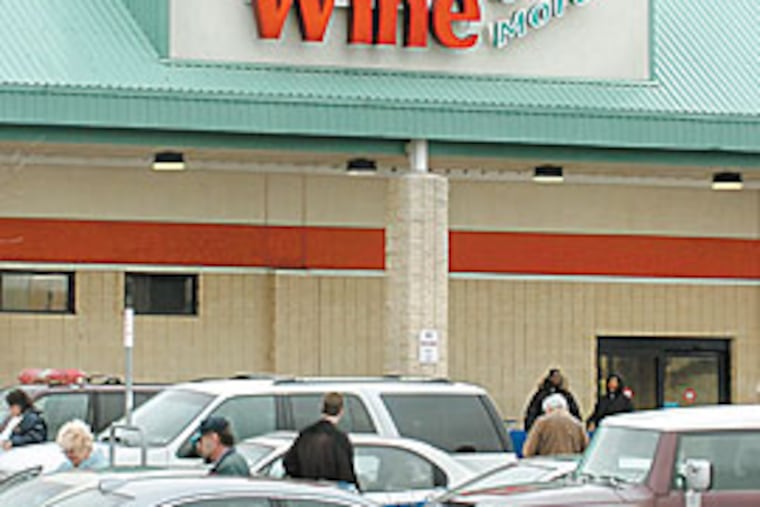Crossing the border with booze not exactly a high-profile crime
Take a look at the license plates at the Total Wine & More store just yards south of the Pennsylvania line. Most of the vehicle tags are from the Keystone State.

Take a look at the license plates at the Total Wine & More store just yards south of the Pennsylvania line. Most of the vehicle tags are from the Keystone State.
What gives? Each of those customers buying booze in Delaware and carrying it back north is breaking Pennsylvania law.
So why are they taking the risk?
A better question is: What risk?
Only 11 people were cited in all of 2007 for illegally importing alcohol, even though the law has been on the books since the 1930s.
Since 2000, only 198 have been charged in the entire state.
"It is very tough to enforce," said State Rep. Robert C. Donatucci (D., Phila.), chairman of the House Liquor Control Committee. Enforcement is labor-intensive. It requires staking out liquor stores across the border, then stopping lawbreakers once they've crossed into Pennsylvania. In Delaware and Cecil County, Md., local police have to be told in advance.
"Anyone can take a look at our parking lot and see it's 80 to 90 percent Pennsylvania," said Lou Grunes, manager at the giant Total Wine & More, just off I-495 in Claymont, Del. "We are 200 yards from the border."
The store often places large advertisements in Pennsylvania papers touting its discount prices and large selection.
"Do I feel guilty? No," said Mario Figurelle, 36, of Middletown Township, Delaware County, who purchased a case of beer at Total Wine. He called Pennsylvania law "ridiculous and outdated."
Traveling through New Jersey, Donatucci has passed liquor stores that have more Pennsylvania license plates in their lots than New Jersey plates, he said. "It is not a big secret we are losing business."
Catching someone with small qualities of out-of-state alcohol often comes second to investigating "quality of life" complaints such as noisy bars, after-hours violations, sales to minors, and routine inspections of 18,000 statewide establishments with liquor licenses, said Capt. Thomas Butler of the State Police Compliance, Auditing and Gambling Enforcement Unit.
The Philadelphia-area unit has about two dozen officer. Last year they did 10 of the 37 "border patrols" in the state.
"What we'd like to get is the truckload," Butler said. "But if you see someone with four or five bottles, you are going to take action. We are not going to ignore that."
The average confiscation last year was just over nine liters of alcohol, the equivalent of about a case of wine. The amount taken from the 198 individuals cited since 2000 totals about 507 cases of wine - about 21/2 cases each, far less than a truckload.
The few who do get caught pay $10 for each container or $25 for each package of beer of wine. The alcohol is then confiscated and destroyed.
Knowing its patrons may be under surveillance won't keep Total Wine from altering its operations, Grunes said.
But the store does draw a line, he said.
"We don't knowingly sell to speakeasies and restaurants because we don't condone that at all," Grunes said.
The Pennsylvania Liquor Control Board is one of the largest buyers of wine and spirits in the United States. With more than $1.6 billion in sales, the LCB flows about $200 million a year in taxes into the state's general fund.
The ban on out-of-state purchases can be traced to the 1936 Johnstown flood, when a 10 percent tax was levied on alcohol to help rebuild the city after 70 buildings were destroyed, 3,000 damaged, and about two dozen people killed.
The tax, which was supposed to be temporary, has grown to 18 percent and is added to the 6 percent sales tax - 7 percent in Philadelphia.
While the law may be hard to enforce, repealing it would start a "free-for-all," Donatucci said.
"We are a monopoly, and we don't want people shopping out of state," he said. The statute is unlikely to change, legislators say.
But for residents near a border, the closest store may be across the line. That's the case in Hanover, on the Mason-Dixon Line, where many residents work in Maryland or Washington and socialize on both sides of the border.
State Rep. Steven R. Nickol (R., York) said he had been trying to "carve out a commonsense solution" when he tacked an amendment onto a House bill to exempt the purchase of 128 ounces (about five bottles) of wine. It never went anywhere.
"Technically it is illegal for you to take a six-pack or bottle of wine to a neighbor's house for dinner because you are crossing a state line," Nickol said.
But not all citizens a short car ride from the border are beating a path to the doors of discount suppliers.
At the Premium Wine & Spirits state store in Media, manager Dave Root, 48, said an improved inventory had kept people from traveling out of state.
"We've been busy here since we opened" in December 2005, he said.
Escalating gas prices are also a factor.
Kay Allen, 69, of Rose Valley, said she had ended her monthly trips to Delaware "when gas got to be $3 a gallon." Selection, location and service now keep her in-state and legal.
"I used to go there all the time, but with gas prices the way they are, it is just as easy to come here," Allen said.
The Rev. Don Wert, president of Pennsylvanians Concerned About Alcohol Problems, said he supported measures to prevent any increase in sales of alcoholic beverages but noted that border enforcement was ineffective.
"I don't think [smuggling] can be won by enforcement," said Wert, who favors education. "You could put 100 cops out there, but that really isn't going to solve the problem. It will frustrate everyone and get nowhere."